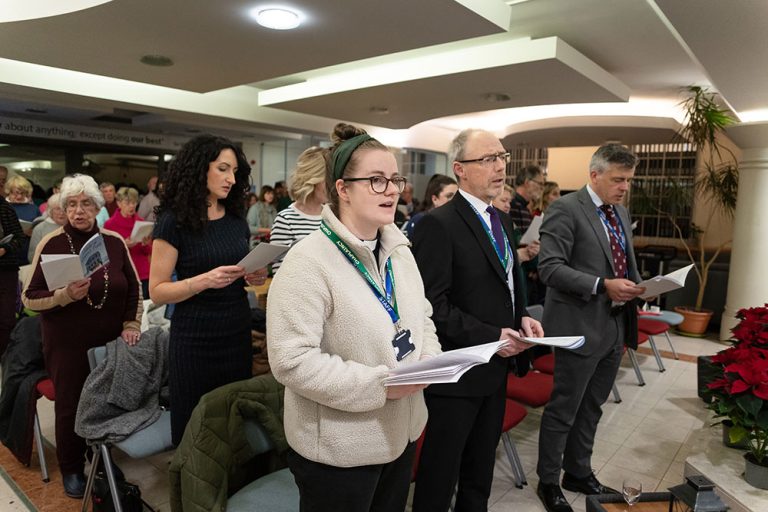As you know, the Student Voice is important here at Chester. What is equally important is coming back to students to let you know how we have responded to your feedback!
Below are just some examples from colleagues across the University that detail changes we have made in response to you taking the time to use your voice.
That’s why completing surveys like our University of Chester All-Student Survey in term one or the National Student Survey (NSS) for level 6 (final year) students is so important.
Our International Student Barometer Survey is another really important survey which has been designed to get specific, detailed feedback from our international students. You can find our responses to the 2023 International Student Barometer Survey for all our international students here.
Thank you for making the time to use your Student Voice.
Learning and Information Services (LIS)
- In response to your comments regarding the LIS queuing system, a new virtual queue system has been implemented that creates a better, more efficient experience for students who need IT support. Instead of having to wait in a physical queue in Seaborne Library at Exton Park, students can join the queue and continue working or take a break whilst they wait for their turn. The estimated waiting time is also provided which allows students to use their time more effectively.
- Following your feedback regarding the need to compete with staff for LIS support, support for staff who need IT help is now handled separately which means LIS staff skills and resources are now more focused on student needs.
- We know that it can be disruptive for students when timetabled teaching sessions are cancelled or there are changes at short notice. We have implemented additional checks and approval mechanisms, in partnership with academic areas, to reduce the amount of timetable changes impacting students.
- Following your feedback regarding the current UoC app, the LIS team are working on a brand-new app which will be implemented in time for the 2025/26 academic year. This should address issues with checking in and attendance.
Careers & Employability
- Following your requests for more in-person careers events, Employer in the Foyer events now regularly take place to connect students directly with recruiting employers. This allows students to gain networking skills, meet recruiters in person, ask questions and make valuable connections.
Chester Students’ Union (CSU)
- Following your feedback regarding communication from CSU, CSU has increased its communication quality and output in the last year through a variety of platforms. This includes the commitment to two blog posts a week, daily Instagram content, publications of CSU events and a new society spotlight newsletter.
- In response to feedback that you would like to see CSU and its officers more frequently at all sites, our 24/25 Elected Officer Team are making it their joint goal to ensure their engagement with students is consistent and covers all sites. In addition to utilising their joint Instagram account, there is at least one officer available at all CSU events and they regularly talk to students on walkarounds. This was evident with our first Speak Week on the theme of money where Officers and the CSU team received 803 survey responses and 311 students actively engaged with our Instagram polls. All this activity is designed to make CSU officers, and CSU in general, more visible across our sites.
- In your feedback, some of you felt that CSU could consider the student voice/ideas more when making decisons. As a result, CSU’s ‘Big Ideas’ process has been simplified to make it easier and quicker to make a suggestion – students are encouraged to submit any suggestion to improve their university experience with a guarantee this will be discussed by the Elected Student Officers and Student Council. The outcome of these Big Ideas will be promoted through CSU’s website and on social media platforms with an explanation as to how the decision was reached to improve transparency.
Academic Skills
- Following your feedback regarding some confusion with best practice for referencing, induction and re-induction materials have been reviewed to ensure they encourage and support students to use Cite Them Right, and guides to all types of referencing, including APA7 referencing, are available on ASk’s Moodle site.
- A weekly online drop-in session (every Thursday, 12pm-12pm, online), has been introduced to provide timely support for small queries which don’t require a dedicated one-to-one session. This allows students to get access to support quickly and easily.
Student Services
- In response to comments that staff aren’t always aware of available student support, we have further developed our staff ‘supporting students’ information sessions. These briefings help raise staff awareness of the wide range of support available from Student Services, and aids with timely signposting and referrals.
- We have also updated our Student Services information video to include all the positive developments that have taken place since the last academic year. It has been circulated university-wide for staff to include in all student inductions and throughout the academic year to provide a reminder about support available.
- In response to comments about waiting times for appointments, Wellbeing and Mental Health have increased the number of on-the-day Duty appointments. This provides students with the option of bookable appointments and on-the-day emergency support Monday to Friday, supported by our 24/7 Student Assistance Programme support. Introducing a daily Duty appointment for Disability and Inclusion has also ensured students with time sensitive needs are seen quickly.
- Launching the new Standardised Inclusion Plans from Disability and Inclusion, which does not require supporting evidence, has provided helpful reasonable adjustments for students that otherwise would not have received them.
- In response to comments around students who receive assessments, students who receive their SpLD and ADHD assessments are now automatically booked an appointment with a Specialist Study Skills adviser to explore their support needs.
- In response to requests for more accessible information on available student support, we have expanded our web-based information. This enables prospective students, applicants, current students, parents/carers and external partners to easily access information that was previously hosted on our internal Portal pages.
- The introduction of highlighting Inclusion Plans on student records, for academic staff, has increased awareness of the reasonable adjustment needs for our Disabled students.
- Student engagement with our 24/7 Student Assistance Programme increased by 56% from the previous year. This positive engagement has resulted in Student Services commissioning this service for another three years. This means you’ll continue to be able to access wellbeing and mental health support 24/7, 365 days a year.
- We delivered bespoke Look After Your Mate Workshops within timetabled classes. These workshops empower students with the skills, knowledge and confidence to support friends experiencing mental health difficulties, whilst looking after their own wellbeing.
- Wellbeing and Mental Health worked with academic areas to improve the Maternity Risk Assessments, creating a new pregnancy support plan.
- In response to comments regarding awareness of wellbeing and mental health support, a marketing campaign was delivered to raise the profile of the support Wellbeing and Mental Health provides. The next stage is exploring how we can highlight our dedicated support for students who are carers, care experienced, estranged or part of the GRTSB (Gypsies, Travellers, Roma, Showmen and Boaters) Community.
- To support our international students with accessing bespoke information to aid with settling into the UK, we have developed our International Toolkit that puts all the information in one place. We have also created a dedicated international tab in the Student Support section of the UoC app.
Apprenticeships
- In response to feedback regarding assessment briefs, we have reviewed and updated the assessment brief for the University. The brief now includes the knowledge, skills, and behaviours associated with the assessments apprentices are requested to complete. This now clearly links all assessed work and feedback to the apprenticeships and academic requirements of the programme.
- We updated the progress review documentation in summer 2024. This now also includes a section of the modules completed and the associated Knowledge, Skills and Behaviours and what the impact is on development for the apprentice and the impact in the workplace.
Posted in Your Student VoiceTagged feedback, student voice, Survey, Your Student Voice








